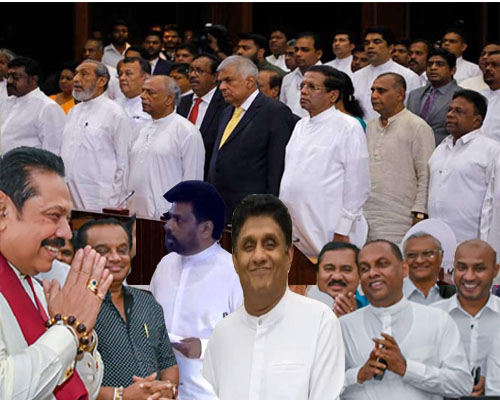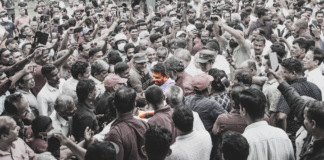The ‘pohottuwa’ party or the ruling Sri Lanka Podujana Peramuna (SLPP) may not be in full bloom, but it hasn’t withered away either. In fact, it is hibernating until the time is right to bloom again.
When the ‘aragalaya’ or the protests at Galle Face were at its peak, there was a clamour for several key demands. The trademark slogan was, of course, ‘Gota, go home’ signifying the rallying cry for Gotabaya Rajapaksa to resign. The protestors also had two other major objectives: establishing a new political culture and system and action against those responsible for corruption and abuse of power in the past few years.
The first demand, that of Gotabaya Rajapaksa’s resignation has been achieved after the former President, unnerved after seeing the wrath of the masses storming President’s House, fled the country. The other demands however, are yet to be fulfilled.
It is into such a scenario that Ranil Wickremesinghe has entered the political arena as the eighth Executive President of the country. In a little more than a month in office, Wickremesinghe has succeeded in engineering a sense of calm and at the same time dismantled and dissipated the protests at Galle Face.
Will that be sufficient to quell the ‘aragalaya’ is a question that is now being asked. At least some believe that, if fuel supplies are normalised just as much as gas supplies have been, the ‘aragalaya’ will be forgotten and Wickremesinghe can carry on as President unhindered until November 2024, when the next presidential election is due. This thinking is fundamentally flawed for several reasons.
Firstly, it is a mistake to assume that the crux of the ‘aragalaya’ was to oust Gotabaya Rajapaksa. While that became the trademark catchphrase, the reason why the ‘aragalaya’ was sustained for so long, the reason why it attracted support from so many from diverse sections of society was because the ‘aragalaya’ represented a nation’s clamour for change, not merely the departure of one Rajapaksa.
Secondly, even the departure of Gotabaya Rajapaksa and the withdrawal of the other Rajapaksas (Mahinda, Chamal, Basil and Namal) from the Cabinet has only been a face-saving tactic for them, a strategic retreat of sorts, so they could regroup, buy time and plan their comeback.
It is no secret that Basil Rajapaksa is very active behind the scenes and is in constant dialogue with Ranil Wickremesinghe, indicating his ‘do’s and don’ts’ in running the government. For instance, Rajapaksa is reported to have submitted to Wickremesinghe a list of names for consideration when appointing Governors to the provinces.
It has also been reported that Basil Rajapaksa is to play a key role in the selection of ministers when the new Cabinet is formed. He is likely to nominate the likes of Johnston Fernando and Rohitha Abeygunawardena, because they are valuable to the ‘pohottuwa’ in their role as attack dogs against the opposition. Therefore, in practical terms, Basil Rajapaksa (and by extension, the Rajapaksas) still call the shots. Such a cabinet, if and when it is formed, will not appease those who supported the ‘aragalaya’; in fact, it would only re-ignite the cry for change.
Thirdly, Wickremesinghe has not been successful in roping in the opposition for his pet project of an ‘all-party’ government. The three major opposition parties, the Samagi Jana Balavegaya (SJB), the Sri Lanka Freedom Party (SLFP) and the Janatha Vimukthi Peramuna (JVP) have all rejected the proposition. The reason is clear: they know that they will be governing with a dishonourable clique of ‘pohottuwa’ ministers and that will become a political liability when elections are due in two years.
Much has been said about Ranil Wickremesinghe being an astute politician. However, he either fails to see this or deliberately chooses to ignore this. If he was indeed a smart tactician, he could still muster a group from the ‘pohottuwa’ which is relatively untainted with corruption allegations (the group led by Dullas Alahapperuma and includes the likes of G.L. Peiris, Anura Priyadarshana Yapa and Charitha Herath, to name a few), invite only them from the ‘pohottuwa’ to his Cabinet- and the response from the opposition might have been very different. Yet, Wickremesinghe chooses instead to turn a blind eye to this prospect, preferring the comfort of greater numbers offered by the pro-Rajapaksa cabal.
Fourthly, for all the bonhomie between Ranil Wickremesinghe and the Rajapaksas, theirs is a marriage of convenience which is still in its honeymoon period. It is simply an ‘I scratch your back, you scratch mine’ situation: Wickremesinghe pounced at the opportunity to become Prime Minister and unexpectedly became President which also helped the Rajapaksas in their hour of need. However, this is not a political love affair that is destined to live happily ever after. That is because both Wickremesinghe and the Rajapaksas are keen to feather their own political nests at the expense of the other.
Basil Rajapaksa is already back at work, reorganising the ‘pohottuwa’. He is relying on Wickremesinghe to avoid general or presidential elections before 2024 by which time he hopes the masses will forget the misery heaped on them by the Rajapaksas and forgive them. Namal Rajapaksa meanwhile has a more ambitious and long-term plan: he is hoping to run for President in 2029, when he can perhaps invoke the ghosts of Rajapaksas past and deceive Sri Lankans into voting for yet another Rajapaksa.
In the meantime, Wickremesinghe is busy trying to rejuvenate the moribund United National Party (UNP) which is why he has appointed the ‘usual suspects’ as his advisors, knowing very well that it is these same people who led him to defeat in 2019.
What all this indicates is that, in terms of the ‘aragalaya’s objectives what it has achieved is only the symbolic departure of Gotabaya Rajapaksa from the Presidency and the temporary and misleading withdrawal of the other Rajapaksas from the Cabinet while they continue to operate behind the scenes.
Therefore, there is every reason to believe that the ‘aragalaya’ is not dead, but in a state of suspended animation, where Ranil Wickremesinghe has been given some breathing space to put Sri Lanka’s political house in order. He is wasting that time and squandering the last chance given to him by history to correct his misdemeanours of the past.
It is only a matter of time before the ‘aragalaya’ will erupt again. This is just the calm before the storm.





